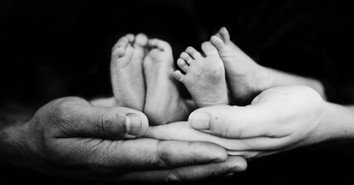3 Things You Should Know about People with Down Syndrome

Today is the tenth anniversary of World Down Syndrome Day, a day to create awareness and dispel myths. The National Down Syndrome Society explains the disorder this way:
“In every cell in the human body there is a nucleus, where genetic material is stored in genes. Genes carry the codes responsible for all of our inherited traits and are grouped along rod-like structures called chromosomes. Typically, the nucleus of each cell contains 23 pairs of chromosomes, half of which are inherited from each parent. Down syndrome occurs when an individual has a full or partial extra copy of chromosome 21.
This additional genetic material alters the course of development and causes the characteristics associated with Down syndrome. A few of the common physical traits of Down syndrome are low muscle tone, small stature, an upward slant to the eyes, and a single deep crease across the center of the palm - although each person with Down syndrome is a unique individual and may possess these characteristics to different degrees, or not at all.”
The world is not comprised of these two groups of people: disordered and normal. We’re all born spiritually disordered, and we will all experience some type of physical disorder or disease, even if we are not born with it, at some point in our lives. There are so many more similarities than there are differences between you and someone with an extra copy of chromosome 21.
Here are 3 things to remember about people with Down Syndrome:
1. People with Down Syndrome are Created in the Image of God (Just Like You).
People have always been created in the image of God, two people before the fall, and billions of people after the fall. The fall did not change how we are created or whose image we are created in, but it did produce far-reaching consequences for our world including pain, disorders, and disabilities. The bottom line is we are all created in the image of God, knit together by Him in the womb, and are equally fallen when we make our debut in this world.
Verses to ponder:
John 9:1-3
“As he went along, he saw a man blind from birth. His disciples asked him, “Rabbi, who sinned, this man or his parents, that he was born blind?” “Neither this man nor his parents sinned,” said Jesus, “but this happened so that the works of God might be displayed in him.”
Jesus is very clear here that this man’s visual disability is not a product of personal or parental sin. The disability is not a personal punishment but rather a product of original sin and its curse on the world. Jesus goes on to explain that God has a purpose for this man’s disability. God’s purposes are sometimes above our finite understanding, but we can trust that everything He does is for His glory and out of love for us.
Psalm 139:13-16
“For you created my inmost being; you knit me together in my mother’s womb. I praise you because I am fearfully and wonderfully made; your works are wonderful, I know that full well. My frame was not hidden from you when I was made in the secret place, when I was woven together in the depths of the earth. Your eyes saw my unformed body; all the days ordained for me were written in your book before one of them came to be.”
God knows. An extra chromosome does not sneak past God; God’s Word tells us that He knits us together in the womb. He knows what effects of the fall we will have to bare in this world, and He has a purpose for it.
John Knight writes this in his desiringGod article, The Happiest People in the World:
“God added that extra copy of chromosome 21 more than a trillion times in a baby with Down syndrome. It is a lot of knitting.”
Exodus 4:11
“The LORD said to him, “Who gave human beings their mouths? Who makes them deaf or mute? Who gives them sight or makes them blind? Is it not I, the LORD?”
2. People with Down Syndrome are Redeemable and Need to Hear the Gospel (Just Like You).
The Bible does not say these people are redeemable and those people are not; God’s Word is clear that all are fallen and all are able to be redeemed because of Jesus’ sacrifice. Christians are called to share the gospel with everyone and everyone includes people with Down Syndrome.
Verses to ponder:
Mark 16:15
“He said to them, “Go into all the world and preach the gospel to all creation.”
The gospel is for everyone and it overcomes all boundaries.
Luke 14:13-14
“But when you give a banquet, invite the poor, the crippled, the lame, the blind, and you will be blessed. Although they cannot repay you, you will be repaid at the resurrection of the righteous.”
This is Jesus turning the culture on its head; the people you would never have invited in your home before invite them in now and expect no repayment…but receive joy in the Lord knowing that His glory has been displayed.
Jesus doesn’t ask us to invite the crippled, the disordered and disabled, and the little children to His table to benefit ourselves…He asks us to invite them because of His great love for them, and He wants us to love them too and to experience the immense joy that comes from loving others without personal benefit or public recognition.
3. The Church Needs People with Down Syndrome (Just Like They Need You).
The church is a body of imperfect believers working together for a perfect Head, Jesus Christ. There is no believer that is not needed by the church, and there is no person that the church should not be welcoming and teaching in their midst. There is so much that the church can learn from those with Down Syndrome; John Knight shares these stunning statistics:
- 99% of those surveyed are happy with their lives.
- 97% answered yes to the question, “Do you like who you are?”
- 99% agreed with the statement, “Do you love your family?”
Do you know of any group of people, of any economic status, educational level, age, ethnicity, or geographic region that approaches those percentages? Who are these happy people? People living with Down syndrome.
As Knight points out this does not mean Down Syndrome is without its hardships like childhood surgeries and higher risks for diseases, costly therapies and education, as well as cognitive disabilities, and how those with Down Syndrome are perceived and treated by some in society. There will be hard days, but what an opportunity for the church to come alongside these parents and these children—to love them like Jesus loves them and to provide hope and help for the parents. Knight reminds us that the God who designs us each uniquely is the same God who promises to supply our every need (Philippians 4:19).
Knight writes,
“And let’s really confound our culture and the world by encouraging those with Down syndrome to develop and use their gifts in our churches. They have God-given good works to do (Ephesians 2:10).”
If you know someone with Down Syndrome or a family with a Down Syndrome child, invite them to your church, and if they are already in your church be prayerful about how you can be a help to them and also how you can learn from them.
Passage to ponder:
1 Corinthians 12:18-27
“But in fact God has placed the parts in the body, every one of them, just as he wanted them to be. If they were all one part, where would the body be? As it is, there are many parts, but one body. The eye cannot say to the hand, “I don’t need you!” And the head cannot say to the feet, “I don’t need you!” On the contrary, those parts of the body that seem to be weaker are indispensable, and the parts that we think are less honorable we treat with special honor. And the parts that are unpresentable are treated with special modesty, while our presentable parts need no special treatment. But God has put the body together, giving greater honor to the parts that lacked it, so that there should be no division in the body, but that its parts should have equal concern for each other. If one part suffers, every part suffers with it; if one part is honored, every part rejoices with it. Now you are the body of Christ, and each one of you is a part of it.” [Bold emphasis added by Crosswalk]
To read Knight’s article in its entirety please visit desiringGod.org.
Crosswalk contributor, Dr. James Emery White, urges us to remember the passage in Mark 10:13-16 where Jesus rebuked the disciples for turning away the little children. He states,
“Jesus took the most vulnerable class of people on the planet and elevated them to the highest access, highest embrace, of all. …To Jesus, those children were everything. Everything He was about, everything He had come for, everything He stood for. Which means they should be everything to us.”
God often uses the things that are overlooked in this world, to teach us about His glory and His Kingdom.
If you know someone with a Down Syndrome child, call them up today or send them a message letting them know how thankful you are for their child in the world and how much God loves them. For more information about World Down Syndrome Day please visit worlddownsyndromeday.org.
Related articles:
How to Parent as a Team When You Have a Special Needs Child
How Special Needs Children are Like Unexpected Gifts
What Parents of Special Needs Kids Want the World to Know
Let the Children Come
Related video:
Christianity.com: Does God's saving grace extend to the mentally disabled who are not able to outwardly acknowledge Jesus Christ?-Joe Thorn from christianitydotcom2 on GodTube.
Photo credit: ©Pexels/Cliff Booth
Publication date: March 21, 2017
Originally published March 21, 2017.





